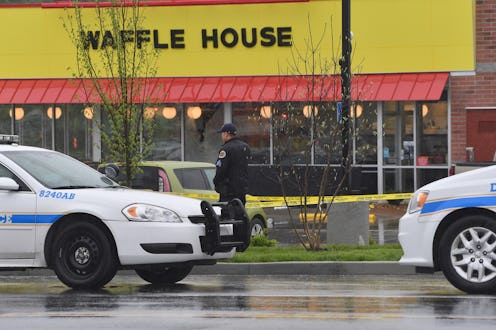News
How An AR-15 Can Be Taken Away From Someone & Still End Up Back In Their Hands

The man who allegedly murdered four people near Nashville on Sunday wasn't supposed to have a gun. The suspected Waffle House shooter's guns had been confiscated from him previously and his gun license was revoked along with them. However, this tragic story is proof that an AR-15 can be taken away from someone — and still end up back in that same person's hands.
The man, who is accused of killing four people at a Waffle House in Nashville's Antioch area early on Sunday morning, allegedly committed that crime using an AR-15, which is an assault-style weapon. One of the diner's customers wrested it from him, but police fear he still has multiple guns in his possession. The situation is heartbreaking for all those involved and still an ongoing source of stress for Nashville's residents, as the alleged gunman remains at large.
Just as consternating, though, is the fact that the authorities had indeed taken the suspect's guns away in the past — and it still didn't prevent the shooting. The AP reported that in July 2017, Secret Service agents arrested the suspect because he had entered a restricted zone near the White House and was refusing to leave because he wanted to meet the president.
The AP reported that as the suspected shooter was an Illinois resident until the fall of 2017, the case then moved to the Illinois state police, who revoked his firearms license and confiscated four guns after the FBI requested it. Illinois officials then gave the guns back to the suspect's father, under the condition that he would "keep the weapons secure and out of the possession of [his son]." According to the AP, however, the father confirmed he gave the guns back to his son.
While Illinois law permits authorities to give confiscated firearms to family members of the people from whom they were originally taken, the man could not legally possess those confiscated guns in Illinois. Tennessee has fairly relaxed gun control laws, though, and it's unclear whether he was in legal possession of the firearm used in the crime.
Because this alleged shooter acted contrary to the existing laws at least in his home state of Illinois, this case could be one that guns rights activists jump on as proof that gun control legislation does nothing to prevent gun violence.
However, it was a lax gun law that allowed authorities to give the guns to his father after they had already been taken away. "Part one of the local law seemed to have worked in that his guns were taken away," Tom Campbell, director of the Newtown Action Alliance, tells Bustle. "But the same law allowed their return to a responsible party, in this case his dad, who made the absolutely wrong decision. Return of weapons should only be handled by the courts after appropriate exams by experts."
According to Campbell, this case is evidence that gun violence prevention laws at the federal level are necessary. With a stricter law in place, the alleged shooter never would have been able to obtain a gun in Illinois. A sheriff in Illinois told the AP that mental health issues were also at play, but not even that always prevents people who want guns from obtaining them. Even with a record and even if the alleged shooter's father hadn't given him back his gun, the suspect still likely could have bought a gun using Tennessee's — or another state's — gun show loophole, where people banned from owning guns can purchase them through unlicensed sellers.
At a press conference following the shooting, the mayor of Nashville, David Briley, called for increased gun control to prevent tragedies like this one.
“We need comprehensive gun reform to address mass shootings, domestic shootings, accidental shootings, and homicides," Briley said. “If we can all just come together for this and for the greater good, we can take these weapons of war off the streets of our country."